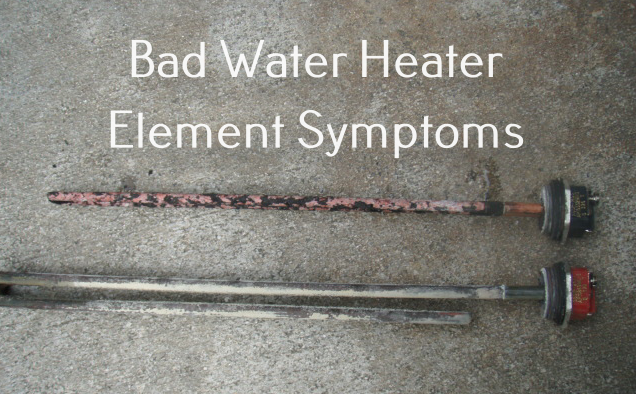Having a skill that can be used to recognize the early bad water heater element symptoms has proven important. It’s a skill that every homeowner must possess as you will not be left out in the freezing water when the system is broken.

Moreover, maintaining the house’s regular water heating system will save you from expensive replacements and water heater repairs.
Bad Water Heater Element Symptoms
Is your water heating system not working correctly? Don’t sweat it. In the following discussions, you will learn the symptoms of bad water heater elements to know how to fix the issues.
- Temperature issues
If you notice the sudden change in your water temperature, one second it’s too hot, then the next second it’s too cold, it sign that there is something wrong with your heating element. Some people usually ignore this issue, but it could be a sign of a much more severe issue that will get worse over time.
- You don’t get enough warm water
If you barely have lukewarm water to either wash the dishes or shower, your water heating system cannot heat the water enough. It can also indicate that your heater requires a thorough check before deciding whether it requires a repair or replacement.
- You hear some unusual sounds.
If you hear some concerning noises from your heater, such as bangs, cracks, or whining, it means to tell you something is wrong with the unit. Some people might not pay close attention to these sounds. It will be the easiest way of telling if the water heater element is bad.
Read also: Hot Water Heater Temperature
Hot Water Heater Element Problems
Getting your water heater fixed isn’t that complicated as long as you can identify some of the following water heating system problems:
- Damaged thermostat
The thermostat is the main monitoring system that controls the temperature of your heater’s element. If this device is damaged or can’t work properly, this can create trouble with your water heater. It constantly makes the water hot, or the heater cannot produce hot water.
- Defective element
You can’t have enough hot water primarily because of a damaged element within your water heating system. This common issue can be identified by checking the element’s resistance with a multimeter.
Read also: How to Test Water Heater Element with Multimeter
It should be understood that the element will break over time due to continuous use. Over time, cracks may occur and prevent the unit from operating correctly.
- Electric went off
If your water heater isn’t supplying you with hot water, it’s advisable first to check whether the power it is turned on or off. Also, check the breaker box to ensure there is no issue with the electrical components, like the circuit breakers. If this component is broken, of course, it will make the heater stop working.
Adding to these problems, it’s crucial for homeowners to periodically remove the metal covers and remove the insulation around the heating elements for a visual inspection. This should be done carefully using a Phillips head screwdriver to avoid damage.
Testing and Replacing Water Heater Elements
Testing the water heater element involves using a multimeter to check for electrical resistance. According to expert advice, the resistance should be between 10 and 32 ohms. Here’s a step-by-step process to test the heating element:
- Turn off the electricity to the water heater.
- Remove the metal cover to access the heating element.
- Disconnect the wires from the heating element.
- Use the multimeter to measure the resistance of the element.
- Replace the element if it shows a reading outside the normal range.
Common Signs of a Burned-Out Element
| Symptom | Description |
|---|---|
| No Hot Water | Indicates the top heating element is burned out. |
| Lukewarm Water | Suggests an issue with the upper heating element. |
| Hot Water Runs Out Quickly | Points to a malfunction with the lower heating element. |
| Circuit Breaker Trips | A malfunctioning element may draw too much electricity, causing the breaker to trip. |
Regular maintenance is key, especially considering the average lifespan of electric water heaters is about 15 years. Notably, those with a square base tend to have a more straightforward inspection process.
A broken element is the most common issue among all the issues that could happen to a water heater. Therefore, it’s important to know the symptoms of the bad water heater element. If all you get is only cold water, it’s a clear sign to act fast and seek professional help.


